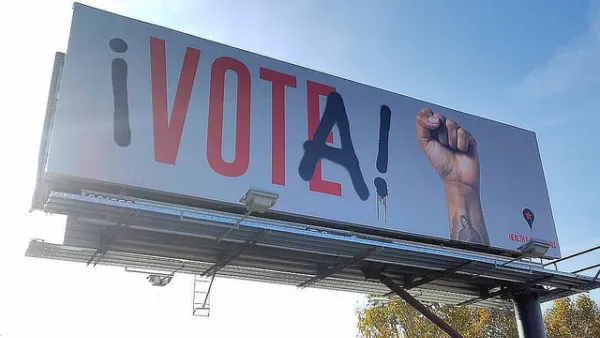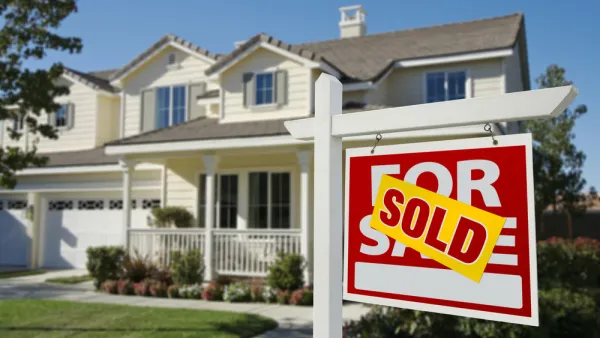California voters will consider a landmark reform of its infamous property tax system this November. Prop. 15 would remove property tax caps on commercial properties established by Prop. 13 in 1978.

The "California Schools and Local Communities Funding Act of 2019" is on the ballot in November, now known as Proposition 19. The controversial ballot initiative would remove the property tax cap for commercial properties established by the state's infamous Proposition 13 vote in 1978. Proposition 19 would not change the property tax system in the state for residential properties—hence the term "split roll" to describe the effect of the reform proposed in the ballot initiative.
Proposition 13 is one of the hottest of buttons in California's political world (as an episode with another Proposition 13, before voters earlier this year, showed yet again), and the support for the state's property tax limits has barely nudged over the years despite strong criticisms of the effect of the law on the state's bottom line. So Proposition 15 was always bound to be one of the most highly contested and closely watched items on the ballot this November.
In an article laying out both sides of the debate, Ben Cristopher provides this summary of the choice before voters this November:
The “Yes on 15” team has marshalled a small army of high-caliber economists, including a Nobel Laureate, to help make its case: politically sympathetic small business owners need not lose sleep over this year’s “split roll” initiative.
But many business owners and commercial real estate experts warn that the hotly contested ballot measure contains a glaring hole — and that many mom-and-pop shops across California are going to fall in.
The question about how hard Prop 15 would hit small businesses mostly focuses on businesses operating under triple net leases, where tenants are obligated to pay rent, an insurance premium, maintenance costs, and the entirety of the relevant share of the building's property tax.
"Business tenants with these leases always face the risk of their landlord selling the building, triggering a reassessment of the property and a tax hike that is shunted off to the renter. But if Prop. 15 passes, thousands of buildings would be reassessed simultaneously — turning that risk into a certainty," according to Christopher.
The Yes on 15 campaign has been working to build a case that most small business owners would emerge from the change unscathed. "A study commissioned by the Yes on 15 campaign in July estimated that 92% of all the new revenue raised by the measure would come from 10.5% of commercial and industrial properties," according to Christopher.
Additional recent research by the consulting firm Beacon Economics, funded by the Silicon Valley Community Foundation, analyzed 12,000 commercial property transactions across the state’s major urban areas. "It found that market rents are best predicted by a number of variables like location, size, vacancy rates and local costs like wages," not taxes, according to Christopher.
The article includes a lot more detail and is an essential read for understanding the nuances of one of the most questions before voters this November with the most significant potential to alter the built environment.
An additional initiative on the ballot in California, Proposition 19, would also reform the state's system of property taxation, but not in a way that's described as a split roll. Proposition 19 was sought by real estate industry interests to provide an incentive for older residents to move, by allowing residents 55 and older to take their current Prop. 13 property tax rate with them if they move. Somewhat confusingly, the measure would also end the so-called "Big Lebowski Loophole," which allows homeowners to pass on their Proposition 13 property tax rate to their children.
FULL STORY: If voters raise taxes on corporate landlords, will small biz foot the bill?

Analysis: Cybertruck Fatality Rate Far Exceeds That of Ford Pinto
The Tesla Cybertruck was recalled seven times last year.

National Parks Layoffs Will Cause Communities to Lose Billions
Thousands of essential park workers were laid off this week, just before the busy spring break season.

Retro-silient?: America’s First “Eco-burb,” The Woodlands Turns 50
A master-planned community north of Houston offers lessons on green infrastructure and resilient design, but falls short of its founder’s lofty affordability and walkability goals.

Test News Post 1
This is a summary

Analysis: Cybertruck Fatality Rate Far Exceeds That of Ford Pinto
The Tesla Cybertruck was recalled seven times last year.

Test News Headline 46
Test for the image on the front page.
Urban Design for Planners 1: Software Tools
This six-course series explores essential urban design concepts using open source software and equips planners with the tools they need to participate fully in the urban design process.
Planning for Universal Design
Learn the tools for implementing Universal Design in planning regulations.
EMC Planning Group, Inc.
Planetizen
Planetizen
Mpact (formerly Rail~Volution)
Great Falls Development Authority, Inc.
HUDs Office of Policy Development and Research
NYU Wagner Graduate School of Public Service




























